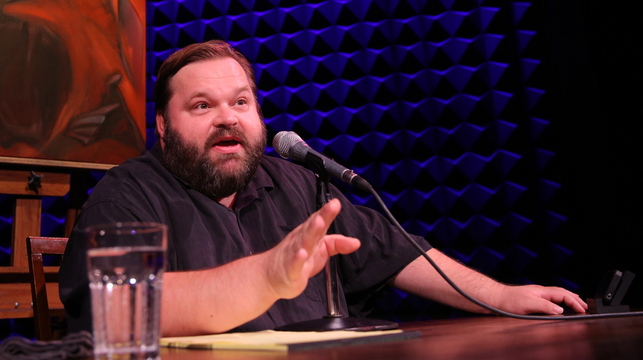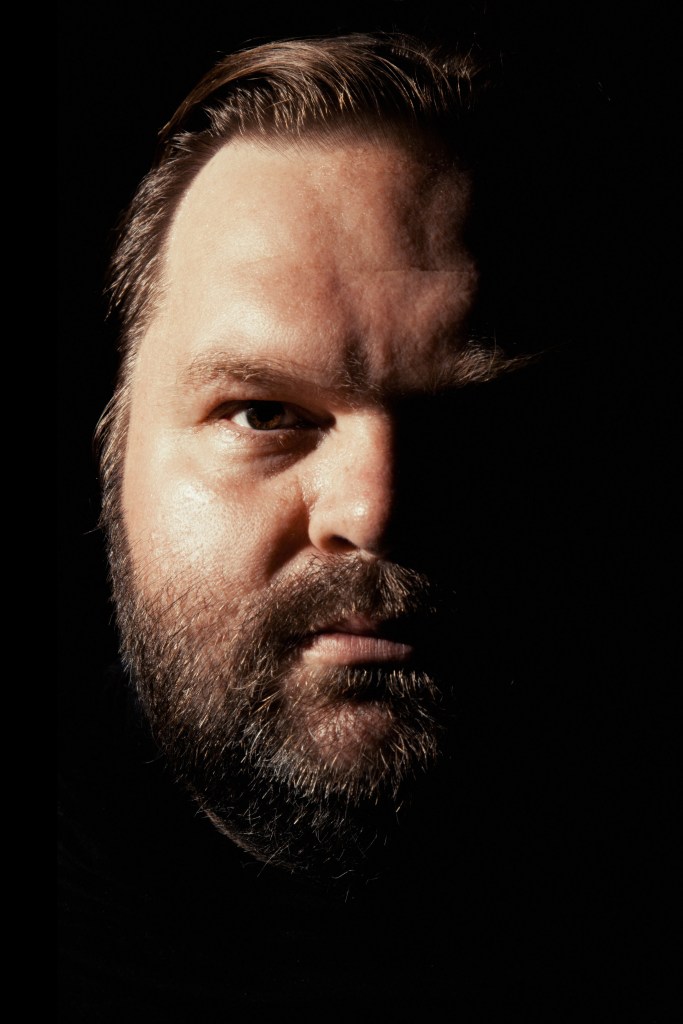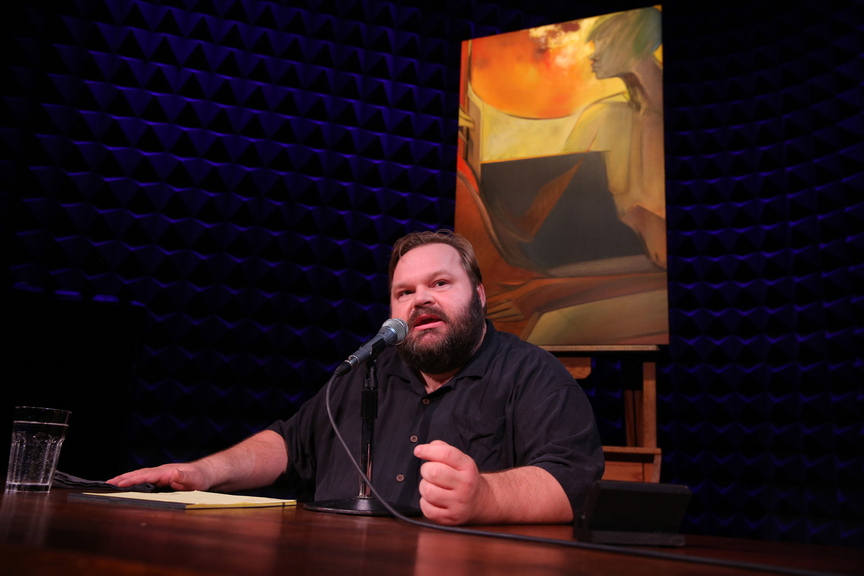As much as you might want him to, Mike Daisey is not going away.
Daisey, raised in Maine, has accomplished great things on the stage in New York and around the country. He is also a liar who used his creative license to embellish facts to make his art more compelling. He’s been exposed publicly, and forced to go on the air to explain himself.
But Daisey, who is home this week to speak at an arts conference in Orono, isn’t hiding from his infamy. At a time in history where public figures are exposed for misdeeds and then disappear from the public eye, Daisey, 37, faced his detractors, took his flogging and kept going.
If anything, his career benefited from his transgression and his response to it.
“Our culture has a sort of script,” Daisey said by phone from Brooklyn, N.Y., where he now lives. “Part of that cultural script is an abject apology and you vanish and are never heard from again. That is the script. But I was not willing to abjectly apologize and vanish.”
Daisey is best known for his storytelling and monologues. A few years ago, he wrote and toured with a one-man show called “The Agony and the Ecstasy of Steve Jobs,” in which Daisey told of his visits to a Chinese factory that makes Apple iPhones and iPads, and revealed horrid working conditions.
Only it wasn’t true. Or at least not to the degree that Daisey suggested.
His embellishments were exposed after he went on the radio program “This American Life” to perform part of his show. It has become the single most popular podcast in the history of “This American Life,” with nearly 900,000 downloads. Angry and inspired, listeners began petitioning Apple to improve its working conditions.
After the episode aired in January 2012, host Ira Glass became suspicious. He and his staff found numerous instances of fabrications in Daisey’s piece. Two months after the radio program aired, Glass retracted the story.
In a note to listeners, Glass wrote, “Daisey lied to me and to âThis American Life’ producer Brian Reed during the fact-checking we did on the story before it was broadcast. That doesn’t excuse the fact that we never should’ve put this on the air. In the end, this was our mistake.
“We’re horrified to have let something like this onto public radio.”
He invited Daisey back on the show to explain himself, and Daisey went, gladly. On the air, he apologized to Glass — not for embellishing the truth but for performing an excerpt of his piece on a news show. “It’s not journalism,” he told Glass. “It’s theater.”
One might think that Daisey would have taken a hit with this episode, that his career might have tanked and that he would have sheepishly slipped into a self-imposed obscurity.
But no.
In the year since, Daisey has continued to perform the piece, still to wide acclaim, with changes to the sections where he made things up. He also just completed a marathon 29-night run of a show called “All the Faces of the Moon,” in which he performed a new two-hour monologue every night for 29 consecutive evenings at his home theater, The Public Theater in Manhattan. Stories about growing up in Maine figured prominently in many of the monologues, which amount to a 1,400-page novel.
The show drew strong reviews, including one from Charles Isherwood in The New York Times. The noted critic saw “All the Faces of the Moon” four times in its first week, and admitted that he had not been looking forward to Daisey’s nightly indulgences.
He warmed to the task, and wrote: “Although the opening monologue had its flaws and wasn’t the most enjoyable of the ones I saw, Mr. Daisey has a remarkable ability to grab and hold an audience. His facility for impromptu asides and entertaining digressions is formidably effective. The aplomb with which he could weave his way back from a seeming dead end almost felt like a magic trick. His sheer storytelling prowess kicked in fairly quickly on that first night, and rarely let up for the next three.”
Daisey is a voracious wordsmith and an insightful observer of humankind, able to weave seemingly unconnected topics into one big story that somehow makes sense.
That he is a big talker is somewhat ironic. When he was a child growing up in Fort Kent, his folks took him to a doctor because he didn’t say anything. He wouldn’t talk. The doctor told his parents not to worry. “Presumably, when he has something to say he’ll start speaking,” the doctor said.
The country doctor got that diagnosis right.
His family lived on the road between Fort Kent and Madawaska, and the closest neighbor was “couple of miles in one direction, and the other one was a couple of miles in the other direction. I grew up with an extreme sense of isolation.”
He learned to talk by talking to himself, or to imaginary friends.
His childhood memory is of “cold and empty vistas, and very beautiful, very naturally beautiful. But very empty, and very vast. I do think there is something about the place, a hardness to Maine, a hard granite quality, a ruggedness. It doesn’t feel like much of the rest of the world, especially when you get up to Fort Kent.”
He’ll talk about all of that when he addresses the Maine International Conference on the Arts on Saturday in Orono. It’s home turf for Daisey, who was raised in northern Maine and moved to the central Maine town of Etna at age 12. He graduated from Nokomis High School in Newport and from Colby College in Waterville,
He left Maine to make a living in theater. He lived for a while on the West Coast, and has lived in New York with his wife and collaborator, Jean-Michele Gregory, for more than a decade. They do not have children.
His father, Bob Daisey, said his oldest son showed early tendencies for the dramatic.
“When he was 5 years old, he would read books and sit in the back seat of the car and tell us the story. But instead of âHere’s what happened’ and the highlights, he would tell you the whole story line by line. âAnd then he said this …’ We used to tell him, âMike, you don’t have to tell us the whole thing,’ but he couldn’t shorten it.”
He was into astronomy and computers, and turned to theater in high school. Bob Daisey remembers attending plays throughout his son’s high school and college years.
He sees his son perform as often as he can. He attended one of the “Lunar” plays in New York, and enjoyed it well enough, but found the topics troubling. “I enjoyed it, but as I told him, I hate it when anybody talks about suicide. But when my son talks about suicide — he has a lot of dark talk in those plays,” Bob Daisey said.
A âDREAM’ STUDENT, âGREAT TALKER’
David Greenham, the former producing artistic director at the Theater at Monmouth, had Daisey as a student in a regional gifted and talented program for high school students. He remembers Daisey as a “dream” student who embraced theater, and gravitated toward improvisation in part because “he was such a great talker.
“There are people who are able to drop their insecurities and just do the task and get it done. Mike was one of those kind of people. He was a quick hand, so creative and so intellectual, and yet his intellect was very accessible.”
In 2008, Daisey performed a monologue called “How Theater Failed America.” The premise of the piece is that theater in America is flawed because it mostly is set up to make theater artists comfortable and rich people happy.
Each night, he invited a different group of theater professionals to see the show and talk about the issues. Greenham was among those Daisey invited to New York.
It was an uncomfortable experience because Daisey spent much of his performance critical of the people he asked to see the show, Greenham said.
He was proud of his former student.
“My view is that if people are threatened, then you probably are saying something that hits a nerve,” he said. “And that’s the thing about Mike. He’s a wonderful person, and his wife is very sweet. They are a great couple. He is really passionate and committed, but this stuff — these stories that he tells — they just come out of his pores. There is not a thing that could happen that would make him say, âI”m not doing this anymore.’ It is absolutely who he is. He is curious about things he doesn’t know about. He sees the world in a different way than a lot of people, and he’s not afraid to talk about it.”
Clearly, Daisey hit a nerve with “The Agony and the Ecstasy of Steve Jobs.” His errors diminished the impact of the piece in some quarters, but he contends that he accomplished his goal of exposing the labor practices in the Chinese technology industry, around which Apple built its empire.
That’s why he apologized only to a point. He may have stretched the truth, but its essence was accurate, he said. As an artist, he had the license to stretch.
The dichotomy of Mike Daisey is his success. He decries the state of theater in America, but has made a comfortable living in theater. He admits being financially comfortable but keeps ticket prices affordable. For his recent run of “All the Faces of the Moon” at the Public in New York, he charged $25 a ticket. That’s considerably less than what theatergoers in Portland pay to see a show at Portland Stage.
In addition, fans can download podcasts of each performance of “All the Faces of the Moon” for free.
“I am dedicated to the price point of zero, which is a really provocative number. Things that are free can either be priceless or worthless depending on how people view them. In a better world, theaters would exist as libraries do,” Daisey said.
one of âAMERICA’S BEST HUMORISTS’
Seattle Rep artistic director Jerry Manning noted that most people compare Daisey to actor and writer Spalding Gray.
“That comparison is apt,” said Manning, who worked with Daisey a dozen years, “but considering the body of his work and his insight and his very deft sense of humor, I compare him to Will Rogers and Mark Twain. I think he is that profound. I really do.
“Every time I see him, I am reminded that Mike is a great writer and an amazing storyteller. But at every juncture, at every comma in a line, I am reminded that he is a (expletive) brilliant actor. His timing, his rapport with audience, the way he moves — he is a consummate actor. I really believe he is a great actor, and I put him among some of America’s best humorists.”
Manning most admires Daisey’s “absolutely crystalline passion for the form itself, for the theatrical form, which he adores, though he pokes fun at it and prods it with a stick at every chance he gets. He does it because he cares about the form. Mike is, for better or worse, a theater person. He comes from a place of deep, deep passion.”
He’s shaking things up, saying things he shouldn’t, making people squirm.
His former teacher from Maine compares Daisey to the Thomas Stockmann character from the Henrik Ibsen play “An Enemy of the People.” At the end of the play, Stockmann rises to denounce the masses, saying that “the strongest man in the world is the man who stands most alone.”
Mike Daisey is one of those guys, Greenham said.
“He’s perfectly willing to stand alone for what he believes, and to say it calmly and forcefully. He’ll offend you. He’ll oppose you, and he’ll be happy to sit down with you and talk to you.
“Pretty brave.”
Bob Keyes can be contacted at 791-6457 or:bkeyes@pressherald.comTwitter: pphbkeyes
Send questions/comments to the editors.






Success. Please wait for the page to reload. If the page does not reload within 5 seconds, please refresh the page.
Enter your email and password to access comments.
Hi, to comment on stories you must . This profile is in addition to your subscription and website login.
Already have a commenting profile? .
Invalid username/password.
Please check your email to confirm and complete your registration.
Only subscribers are eligible to post comments. Please subscribe or login first for digital access. Here’s why.
Use the form below to reset your password. When you've submitted your account email, we will send an email with a reset code.